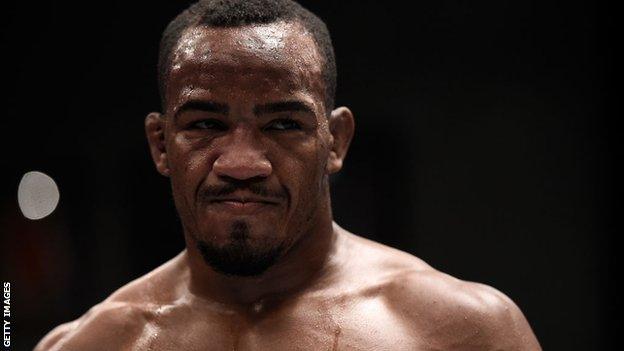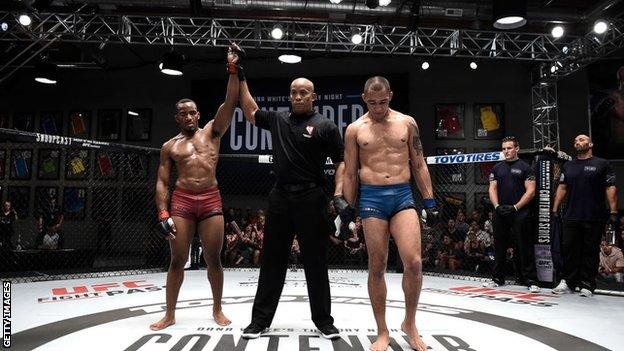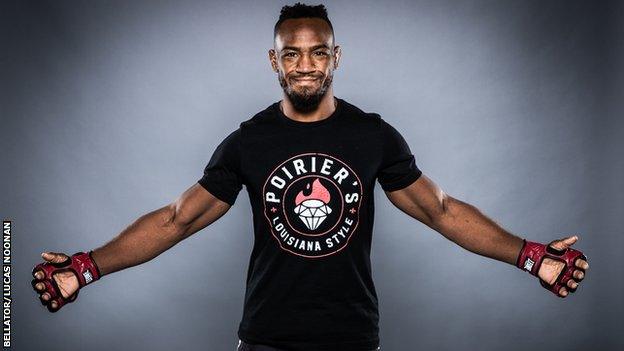Bellator MMA: Homeless, alone and dodging gun fire - the incredible rise of Sidney Outlaw
- Published

Sidney Outlaw fights on Friday at Bellator 283
Bellator 283 | |
|---|---|
Venue: Emerald Queen Casino and Hotel, Washington, USA Date: Friday, 22 July | |
Coverage: Watch on BBC iPlayer from 23:55 BST with reaction on BBC Sport website & app. Highlights on BBC Three from 23:35 on Saturday, 23 July. | |
Sidney Outlaw was walking to a nearby park in New Jersey to sleep rough for the night when four shots rang out.
The MMA fighter and then part-time bouncer started running with his knees high, fearful the shooter would hit him in the leg.
"Only thing in my head was, 'man I hope they don't shoot my leg because I wouldn't be able to fight'," he remembers.
A car had been circling the street Outlaw was walking on. He hadn't noticed. It was the end of another long day, he was on his "schedule" as he puts it.
Outlaw would train in the day and then work until at least 2am each evening - he had to be back in the gym for sparring at 9am. He had been homeless on and off from when he was 19 until he was 27, when he signed with Bellator.
His life in that period was full of danger and stress. The Philadelphia-born lightweight was regularly robbed and for the most part completely by himself.
"It was horrible," he says. "It was a lot, all the time.
"I was almost dumbfounded… not exactly scared. I believed I could get out of it. It took forever and if I had to go back in time I probably wouldn't do it over. I could have gone home any day of the week but I was beyond stubborn. Not even stubborn, driven?"
He had taken a last-minute fight that weekend, as he often did. But the previous week he had thrown out a drunk guy, acting up trying to impress a girl.
"People say things all the time but when a real person says something, you feel it. I know gangsters. That guy was not lying," Outlaw says.
'I didn't know the next time I would eat'

Outlaw says signing with Bellator in 2019 changed his life
Being vulnerable was Outlaw's daily life. He didn't tell his family that he was homeless, he refused to go home. Working security wasn't easy.
"A night without a fight was the best," he says.
"But they fed us and that's where I got a lot of my food. It made me heavy but I ate it because I didn't know the next time I would eat. They bring me chicken fingers or French fries, I'd eat. I'm hungry. I had to eat."
Outlaw, now 30, made his amateur debut when he was still a teenager in high school. He discovered MMA after his mother moved him out to the suburbs of Philadelphia, away from the troubled area he grew up in.
"I actually believed my mum was evil," he says, explaining she would never allow him or his siblings to roam free, not even to the park across the street.
"As I got older I realised we weren't allowed to go to the park because it was terrible, that park was like a cemetery. It was a rec centre and bodies were always found there. My mum was disciplined, it was always back in the house.
"In the house we had hot food, some games - we had no idea if she was struggling or not.
"But my mom is the real gangster. Worked two jobs, barely slept."
'I was nothing special'

Outlaw will soon fight for the Bellator world title
MMA became Outlaw's obsession. When he was 18 he decided he wanted to move to New Jersey, where the likes of UFC star Frankie Edgar and Bellator champion Eddie Alvarez trained.
The situation quickly deteriorated and Outlaw found himself homeless as a young kid with big dreams.
He made no money fighting, but did often get a hotel room and a meal voucher. He fought in UFC president Dana White's Contender Series in 2017, making $5,000 to show and $5,000 to win. "I was rich after that," he says.
It would still be another two years until Bellator signed him to a multiple-fight deal. He had 13 wins and three losses on his record at the time and had fought for nine different promotions.
"I was by myself. YouTube was my best coach," he continues. "But I had confidence because I knew win, lose or draw I had to keep going. I had to be a great fighter."
Outlaw was scheduled to fight for the lightweight title this Friday at Bellator 283 before champion Patricky 'Pitbull' Freire was forced to pull out because of an injury.
Now Outlaw fights Tofiq Musayev, a former champion in Japanese promotion Rizin. He knows very little about the Azerbaijan fighter, other than that he is a striker.
But for Outlaw his life is unrecognisable. He is planning to get his teeth fixed and is looking at houses. He has a dog he loves. He will fight for a Bellator world title once Pitbull is healed. He attributes his rise to his mother's influence, his faith in God and in himself.
"I was nothing special," he insists. "I was a fat, ashy black kid from Philadelphia. Trust me, if I can do this, just imagine what you could do if you committed to it.
"I'm a guy that has no problem dying on his shield," he adds. "A guy who will do anything or give anything for what I love."